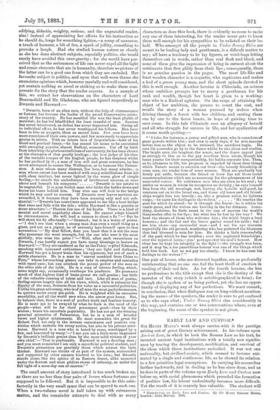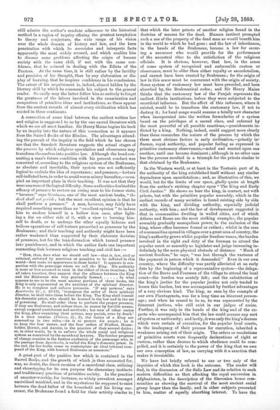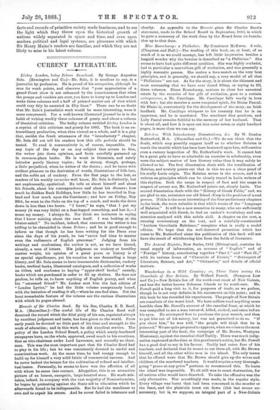EARLY LAW AND CUSTOM.*
Sill HENRY MAINE'S work always carries with it the prestige arising out of great literary achievement. In his volume upon Ancient Law, in which he took the Roman Law as his texts he invested ancient legal institutions with a totally new signific- ance by tracing the development, modification, and survival of the ideas which those institutions embodied. It was not one nationality, but civilised society, which seemed to become ani- mated by a single and continuous life, as he showed its relation to a few primitive legal conceptions. In carrying his researches farther backwards, and in dealing as he has since done, and as he does in parts of the volume upon Early Law and Custom now before us, with social phenomena which preceded the formation of positive law, his labour undoubtedly becomes more difficult. Yet the result of it is scarcely less valuable. The student will • Dissertations on Early Late and Custom. By Sir Henry Stunner Maine. London: John Murray. 1833.
still admire the author's resolute adherence to the historical method in a region of inquiry offering the greatest temptation to theory and conjecture, the wide range of his vision over the whole domain of history and law, and the keen penetration with which he associates and interprets facts apparently the most widely severed, and which enables him to discuss some problems affecting the origin of human society with the same skill, if not with the same con- fidence, that he evinced in dealing with the Edicts of the Praetors. At the same time, it is still rather by the lucidity and precision of his thought, than by any elaboration or dis- play of learning, that he inspires confidence in his conclusions. The extent of his acquirement is, indeed, almost hidden by the literary skill by which he commends his subject to the general reader. So easily may the latter follow him as entirely to forget the greatness of the labour involved in the examination and comparison of primitive ideas and institutions, as these appear from the ancient records of almost every civilisation which has existed in three continents.
A connection of some kind between the earliest written law and religion is suggestel to us by the one sacred literature with which we are all most familiar. Sir Henry Maine begins his book by an inquiry into the nature of this connection as it appears from the Sacral Books of the Hindus. The advantages attend- ing the pursuit of the inquiry in the field which he has chosen are that the Sanskrit literature suggests the actual stages of the process by which religious speculation and observance may transform themselves into positive law. Although the bond con- necting a man's future condition with his present conduct was conceived of, according to the religious system of the Brahmans, as absolute and inevitable, their system was not sufficiently logical to exclude the idea of repentance ; and penance,—torture self-inflicted here, in order to avoid worse misery hereafter,—occu- pied an important place in their teaching. It was not that they were unaware of the logical difficulty. Some authorities doubted the efficacy of penance to restore an erring man to his former state,
"because," says Gaulanta, one of the most ancient books, "the deed shall not perish ; but the most excellent opinion is that he
shall perform a penance." A man, however, may fairly have required something more than an "excellent opinion" to induce him to enclose himself in a hollow iron case, after light- ing a fire on either side of it, with a view to burning him- self to death, or to undergo the other equally hideous and tedious operations of self-torture prescribed as penances by the Brahmans ; and their teaching and authority might have been rather weakened than supported by their elaborate doctrine of penances, but for the transformation which turned penance into punishment, and in which the author finds one important connecting-link between religious teaching and civil law :—
"How, then, does what we should call law—that is, law, civil or criminal, enforced by sanctions or penalties to be inflicted in this
world—first make its appearance in these books ? It appears in con- nection with the personage whom we call the King. His authority is more or less assumed to exist in the oldest of these treatises ; but all taken together, they suggest that the alliance between the King and the Brahmans was very gradually formed In what appears to me to be the most ancient portions of these books, the
King is only represented as the auxiliary of the spiritual director. He is to complete and enforce penances. If any persons,' says Apastamba (ii., v. 10-13), transgress the order of their spiritual director, he shall take them before the King. The King shall consult his domestic priest, who should be learned in the law and in the art of governing. Ho shall order them to perform the proper penance, if they are Brahmans, and reduce them to reason by forcible means, except corporal punishment and servitude ; but men of other castes the King, after examining their actions, may punish, even by death.' In a later treatise (Vishnu, iii., 2), the duties of a King are summed-up in two rules,—he is to protect his people ; he is to keep the four castes, and the four orders of Student, House- holder, Hermit, and Ascetic, in the practice of their several duties ; or, in other words, he is to enforce the whole social and religious system as conceived by the sacerdotal lawyers. The further progress of change consists in the further exaltation of the personage who, in the passage from Apastamba, is called the King's domestic priest. In the end, the law-books come to contemplate an ideal tribunal com- posed of the King, with learned Brahmans as assessors."
A great part of the positive law which is contained in the Sacred Books, and the growth of which is thus accounted for, was, no doubt, the direct creation of a sacerdotal class, utilising and stereotyping for its own purpose the elementary instincts and traditionary practices of primitive society. In the practice of ancestor-worship, for instance, so widely prevalent amongst uncivilised mankind, and in the mysterious tie supposed to exist between the dead father of the household and his living suc- cessor, the Brahmans founi a field for their activity similar to
that which the later priests of another religion found in the doctrine of masses for the dead. Human instinct prompted such a use of the property of the dead man as would benefit him in the world to which he had gone ; and the law of inheritance, in the hands of the Brahmans, became a law for secur- ing a successor who would provide for the performance of the ancestral rites to the satisfaction of the religious officials. It is obvious, however, that law, in the sense of some system of recognised and enforceable custom or observance, must be older than either royalty or sacerdotalism, and cannot have been created by Brahmans; for the origin of law in this sense must be concurrent with the origin of society. Some system of customary law must have preceded, and been absorbed by, the Brahmanical codes ; and Sir Henry Maine thinks that the customary law of the Punjab represents the earliest Hindu institutions, before they were subjected to the sacerdotal influence. But the effect of this influence, where it existed, would be to transform the customary law, if not to destroy it ; for local usage would assume a totally new character when incorporated into the written formularies of a system based on the privileges of a sacred class, and enforced by the most powerful of all possible sanctions,—punishments in- flicted by a king. Nothing, indeed, could suggest more clearly than these researches the nature of the process by which the three most obvious factors in early civilisation,—priestly in- fluence, royal. authority, and popular feeling as expressed in primitive customary observances,—acted and reacted upon one another, until one became dominant ; although in no other case has the process resulted in a triumph for the priests similar to that obtained by the Brahmans.
In the Western world, or at least in the Teutonic part of it, the authority of the king established itself without any similar dependence upon sacerdotalism ; and, as illustrative of this, we would, but for the limits of our space, gladly quote at length from the author's striking chapter upon "The King and Early Civil Justice." He shows us here the king, in contact, not with priests, but with the primitive popular assembly, which in the earliest records of many societies is found existing side by side with the king, and dividing authority, especially judicial authority, with him ; and the law of development suggested is that in communities dwelling in walled cities, and of which Athens and Rome are the most striking examples, the popular assembly gradually monopolises power, to the exclusion of the king, whose office becomes formal or extinct ; whilst in the case of communities spread in villages over a great area of country, the king's authority grows whilst popular freedom wanes, the burden involved in the right and duty of the freeman to attend the popular court or assembly as legislator and judge increasing in- definitely by the mere physical obstacle of distance. "Much of ancient freedom," he says, "was lost through the vastness of the payment in person which it demanded." Even in our own country, where the difficulty was partly alleviated at an early date by the beginning of a representative system—the delega- tion of the Reeve and Fourmen of the village to attend the local court—the burden was acutely felt ; and the substitution of the king's justice for the popular justice not only tended to lessen this burden, but was accompanied by further advantages of a very obvious kind. The king, as seen by the example of our own Plantagenets, was for a long time an itinerant person- age ; and when he ceased to be so, he was represented by the itinerant justices, who still exist in our judges of assize. Further, it was only in the hands of the king and of the ex- perts who accompanied him that the law could assume any sort of system or uniformity; and lastly, it was only the king's decrees which were certain of execution, for the popular local courts, in the inadequacy of their process for execution, inherited a weakness arising out of their origin. The orders or resolutions of primitive courts were frequently declarations of right or custom, rather than decrees to which obedience could be com- pelled, and it is certainly to the power of the king that we owe our own conception of law, as carrying with it a sanction that makes it irresistible.
We have but briefly referred to one or two only of the inquiries of which this book is the outcome. The reader will find, in the discussion of the Salle Law and its relation to such modern difficulties as that affecting the royal succession in. Afghanistan, in the description of the Slavonian house com- munities as showing the survival of the most ancient social group larger than the family, and in other subjects presented to him, matter of equally absorbing interest. To have the
facts and records of primitive society made luminous, and to see the light which they throw upon the historical growth of nations widely separated in space and time, and even upon modern political and legal systems, are pleasures with which Sir Henry Maine's readers are familiar, and which they are not likely to miss in his latest volume.




































 Previous page
Previous page